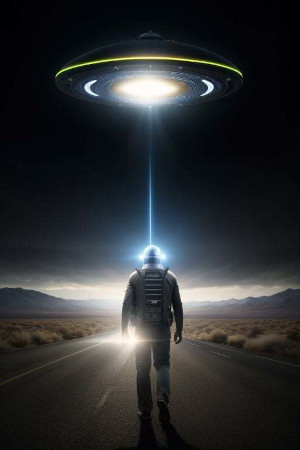2012
May
08
Do We HAVE to Conform to Known Science?
Science fiction just ain't what it used to be.
I grew up on the Tom Swift, Jr., series and give it much of the credit for my going into science and engineering. I have all the books except for two or three, and re-read them every now and then. When I do, I put myself back in the '50s where I can pretend that going to the moon is still a futuristic dream and Atlantis might be sitting in uncharted depths of the sea. As great as those books are, they would never make it today in our more scientifically mature world.
Jules Verne couldn't write Journey to the Center of the Earth because we know too much geology. H. G. Wells couldn't write First Men in the Moon because we've been there. H. Rider Haggard probably wouldn't write She because there are no longer any mysterious unexplored regions of "deepest, darkest Africa." Although new scientific discoveries have opened up new opportunities for science fiction, they have ruined some of the romance of the earlier ages. We can't be as fantastic in our imagination. We feel compelled to adhere to strict scientific accuracy.
Indeed, if I write about a civilization on another planet, I check the spectral class, age, and luminosity of the star. Is it in a binary system that might make stable planetary orbits impossible? What is the exact relativistic time dilation at such-and-such a velocity? You need to know that to get there if you don't have warp drive. We can't have a chlorine atmosphere because chlorine is a relatively rare element overall, and the odds of enough collecting to make an atmosphere not overwhelmed by nitrogen or hydrogen or methane or ammonia is vanishingly small. Besides, it is highly reactive and would probably all be in compounds.
So, does that mean every piece of fiction we write has to conform to accepted science?
Of course not! If that were the case, instead of writing science fiction, we would be writing science fact. We can get away with bending the rules simply because we don't know everything. There can be, at times, a huge gulf between what is known and what is accepted -- we don't know nearly as much as we think we do. Science might tell you that the RNA World Hypothesis is the most likely explanation for the origins of life on Earth, but rarely will anyone mention that the likelihood still borders on the impossible. There are still a lot of opportunities for our imagination to run wild.
 Case in point: the Pioneer anomaly.
Case in point: the Pioneer anomaly.
In a nutshell, Pioneer 10 and Pioneer 11 both left the solar system a tad bit slower than accepted physics predicts. Theories abounded, from gas leaks to higher than expected matter density in space, to new cosmologies that consider the fact that the measured magnitude of the anomaly is almost exactly the Hubble constant times the speed of light. A breakthrough might have occurred when Francisco, Bertolami, Gil, and. Páramos found that by using the Phong reflection model with suitable parameters, the anomaly could be explained as radiation pressure off the back of the radio dish. There is other evidence that supports this theory, which has become the commonly accepted explanation. However, I called the Phong model a possible breakthrough because it hardly proves anything.
I'm pretty sure my undergrad astronomy professor called it the Hubble Effect, though that term is also used to mean red shift. What he was referring to is the tendency over time for the accepted value of the Hubble Constant to change. Each new number would find further researchers agreeing with it until someone had the courage to publish a new number, at which time the next several investigators would come up with that number instead. It seems there is a tendency in science to keep looking for errors until you get the number you expect, at which time you assume you've got it right. The Phong reflection model may fall into that category.
The Phong model does not come from physics; it comes from computer graphics. It is one of several used to model reflections on a surface when rendering an image. Alongside it are the Blinn, Cook-Torrance, Lambert, Minnaert, Oren-Nayar, and Ward anisotropic models. Probably more. The point is, given so many models, each with tweakable parameters, it is not surprising that we can find some combination that fits the data. And the only data that had to fit here was a single value for radiation pressure. You can always fit some model to your data; it does not mean that the model is correct.
An additional shadow of doubt upon radiation pressure's being the explanation is the possibly related flyby anomaly. Once again, things aren't moving as current theory predicts, this time as craft approach Earth in a close flyby orbit. Sometimes -- not all the time -- they end up with some extra energy. The effect has been observed often enough not to be a fluke, but this time there is no Phong radiation pressure to come to the rescue. No, it is apparently not general relativistic frame-dragging, which was my first thought when I read about it. We have no clue what is behind it.
The bottom line is, there is something going on in space that current theory cannot explain.
Does this mean Einstein was wrong? Well, it seems that modern physics thinks so, anyway, in the same sense that Maxwellian electrodynamics is wrong. General relativity is a geometrical model of gravitation. Physicists are working hard to find a quantum mechanical model, looking for the graviton. Although the two have mathematical similarities, they are not the same thing. Also, there are tensor-scalar-vector and scalar-tensor-vector (they're different; general relativity is tensor-only) theories of gravitation that explain anomalies in the expansion of the universe and the orbital mechanics of galaxies without invoking dark matter, which it seems we are so far unable to find. They've lost popularity because there is other evidence for dark matter, but they're not dead.
All it takes is one additional term in the field equations to make our understanding of the universe radically different. A term that explains both the Pioneer and flyby anomalies, perhaps. That term might make the Alcubierre warp bubble impossible, but make something else probable. We don't know, since we don't know that that term might be. We have only been looking at gravitation this way for about a century. How much will we know after ten centuries? I believe it is several hundred years too early to making some rash claim that faster-than-light travel is impossible. If we can't even explain the behavior of objects in Earth orbit, how can we expect to understand everything that is out there?
The crux of all this is that there remains plenty of room for speculation. It might just be a little harder to find than it used to be. We know there is something unexplained about the laws of motion. We have no theory to explain the origin of life, only a handful of unlikely hypotheses. There are spectral lines in stars and the interstellar medium that we are unable to identify. Overall, there are hundreds or thousands of openings to justify exceeding the bounds of accepted science.
This doesn't mean, of course, that we are free to throw scientific opinion to the wind. The days of John Carter on Mars are dead forever. I would recommend using deviations from accepted theory sparingly, and at least have some viable explanation for them in mind. But we can't allow current science to choke out speculation, because speculation is what science fiction is all about. If your story needs warp drive, then by all means warp drive is possible.
There is a "movement" within the community called Mundane Science Fiction, which excludes the possibility of faster-than-light travel or interaction with aliens. To that I say, "Hogwash!" There will be a blog entry about that someday.
F. Francisco, O. Bertolami, P. J. S. Gil, J. Páramos, Modelling the reflective thermal contribution to the acceleration of the Pioneer spacecraft















Comments
by Michael Webb on 2012 May 15
Yeah I agree. People tend to forget just how much people's perceptions of the world have changed. A lot of things we thought were impossible can be done now. I do like a basic appearance that something is possible, but I don't think picking a book to death over what we think is possible now. It just doesn't make sense, and it's kind of obnoxious.
by duane on 2012 May 15
Exactly. One of the things that came up here at the University of Pittsburgh recently is a plastic that changes color when you stretch it -- across the whole spectrum. I'm not sure what the use might be, but who would have even THOUGHT of such a thing? Probably not me.
by Michael Webb on 2012 May 15
Yeah I agree. People tend to forget just how much people's perceptions of the world have changed. A lot of things we thought were impossible can be done now. I do like a basic appearance that something is possible, but I don't think picking a book to death over what we think is possible now. It just doesn't make sense, and it's kind of obnoxious.
by duane on 2012 May 15
Exactly. One of the things that came up here at the University of Pittsburgh recently is a plastic that changes color when you stretch it -- across the whole spectrum. I'm not sure what the use might be, but who would have even THOUGHT of such a thing? Probably not me.
You must be logged in to post a comment.